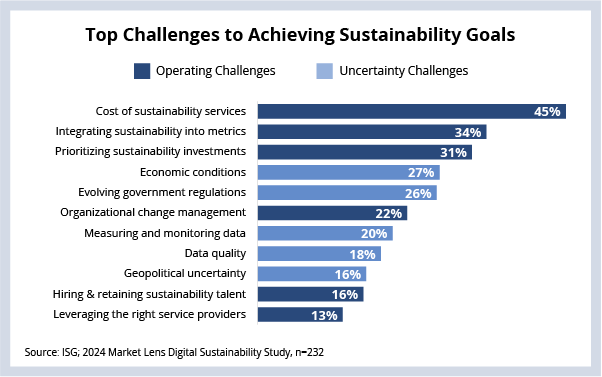Hello. This is Alex Bakker with what’s important in the IT and business services industry this week.
If someone forwarded you this briefing, consider subscribing here.
The Future
Sustainability is all about the future, and whether companies are focused on environmental, social or governance goals in their sustainability strategy, the goals are decidedly long-term. Whether that long-term focus is due to the need to spread out the costs of change or to ensure the long-term outlook of the business, sustainability programs operate on a time horizon far greater than quarterly earnings.
The problem is that the future is unknowable – and the further into the future you look, the more uncertain it becomes. The irony is that, while trying to address the uncertain needs of the future, sustainability programs face an immediate problem stemming from the uncertainty of the present.

Background
A few weeks ago, we shared some preliminary results from our 2024 Market Lens Digital Sustainability Study that identified a trend among enterprises seeking providers to help them report and benchmark their sustainability solutions.
This week, we are looking at the top challenges organizations face in trying to achieve their sustainability goals in 2024. Notably, half of the top ten challenges are related to operations and half are related to uncertainty.
The interesting thing about these results is that organizations were asked about challenges they face in meeting goals in the short term, in 2024, and yet they answered with challenges that have long-term implications for sustainability programs. For example, it is natural to feel cost pressures in the short term. For almost any project that needs to show results in the next ten months, budgets are a natural bottleneck since investment dollars are often the surest accelerator. And integration of sustainability goals into business metrics and the prioritization of investments are similarly short-term.
But the challenges related to uncertainty impact longer-term objective setting. It’s not hard to imagine the difficulties of integrating sustainability into business metrics if you don’t trust the data your business is collecting about its sustainability programs, or if economic uncertainty is putting pressure on your business. And, of course, if your business is struggling to measure the effectiveness of sustainability investments, then allocating costs to those initiatives will become more difficult in the future.
What's Next
Also in the study, organizations indicate that the budgets for all three pillars of sustainability (environmental, social and governance) are expected to increase year on year, with enterprise spending increasing between 3-4%. Clearly, then, short-term uncertainty hasn’t halted all investment.
In the long term, organizations are altering their strategies to incorporate or prioritize sustainability goals, and that means the sum of near-term activities need to align with longer-term outcomes. As with so many business domains, the limiting factor with sustainability is the ability to collect and analyze data that will reveal what works. Based on the challenges we see in this study, organizations need help in the present to address their priorities of the future.
